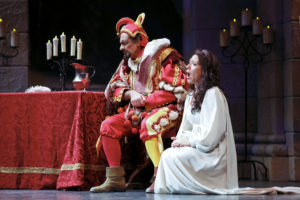

The psychology of the heroine in Manon Lescaut, as in succeeding works, dominates the dramatic nature of Puccini’s operas. Beginning with this opera, Puccini carefully selected the subjects for his operas and spent considerable time on the preparation of the librettos. Puccini returned from Bayreuth with the plan for Manon Lescaut, based, like the Manon of the French composer Jules Massenet, on the celebrated 18th-century novel by the Abbé Prévost. Nevertheless, Ricordi continued to have faith in his protégé and sent him to Bayreuth in Germany to hear Wagner’s Die Meistersinger. Puccini’s second opera, Edgar, based on a verse drama by the French writer Alfred de Musset, had been performed at La Scala in 1889, and it was a failure. The two were finally able to marry in 1904, after the death of Elvira’s husband. Tempestuous rather than compliant, she was justifiably jealous and was not an ideal companion. This home was to become Puccini’s refuge from life, and he remained there until three years before his death, when he moved to Viareggio.

In 1890 they moved to Milan, and in 1891 to Torre del Lago, a fishing village on Lake Massaciuccoli in Tuscany. Finding in their passion the courage to defy the truly enormous scandal generated by their illegal union, they lived at first in Monza, near Milan, where a son, Antonio, was born. He also commissioned Puccini to write a new opera for La Scala and gave him a monthly stipend: thus began Puccini’s lifelong association with Giulio Ricordi, who was to become a staunch friend and counselor.Īfter the death of his mother, Puccini fled from Lucca with a married woman, Elvira Gemignani. The music publisher Giulio Ricordi immediately acquired the copyright, with the stipulation that the opera be expanded to two acts. Le villi was remarkable for its dramatic power, its operatic melody, and, revealing the influence of Richard Wagner’s works, the important role played by the orchestra. The judges did not think Le villi worthy of consideration, but a group of friends, led by the composer-librettist Arrigo Boito, subsidized its production, and its premiere took place with immense success at Milan’s Verme Theatre on May 31, 1884. In the same year, he entered Le villi in a competition for one-act operas. On July 16, 1883, he received his diploma and presented as his graduation composition Capriccio sinfonico, an instrumental work that attracted the attention of influential musical circles in Milan. In the autumn of 1880 he went to study at the Milan Conservatory, where his principal teachers were Antonio Bazzini, a famous violinist and composer of chamber music, and Amilcare Ponchielli, the composer of the opera La gioconda. A performance of Giuseppe Verdi’s Aida, which he saw in Pisa in 1876, convinced him that his true vocation was opera. He first studied music with two of his father’s former pupils, and he played the organ in small local churches. He was orphaned at the age of five by the death of his father, and the municipality of Lucca supported the family with a small pension and kept the position of cathedral organist open for Giacomo until he came of age.

Puccini initially dedicated himself to music, therefore, not as a personal vocation but as a family profession. Puccini was the last descendant of a family that for two centuries had provided the musical directors of the Cathedral of San Martino in Lucca. His mature operas included La Bohème (1896), Tosca (1900), Madama Butterfly (1904), and Turandot (left incomplete).
#Tosca opera sarasota full
Giacomo Puccini, in full Giacomo Antonio Domenico Michele Secondo Maria Puccini, (born December 22, 1858, Lucca, Tuscany -died November 29, 1924, Brussels, Belgium), Italian composer, one of the greatest exponents of operatic realism, who virtually brought the history of Italian opera to an end.


 0 kommentar(er)
0 kommentar(er)
